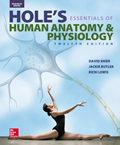1 A) facilitation B) divergence C) convergence D) autonomic switching 2 A) effector B) interneuron C) sensory neuron D) receptor 3 A) brain and cranial nerves B) brain and meninges C) cranial and spinal nerves D) brain and spinal cord 4 A) dura mater B) arachnoid mater C) periosteum D) pia mater 5 A) arachnoid mater and the dura mater B) dura mater and the bones of the skull C) pia mater and arachnoid mater D) pia mater and the surface of the brain and spinal cord 6 A) at the sacrum B) between thoracic vertebrae 11 and 12 C) between lumbar vertebrae 1 and 2 D) at lumbar vertebra 5 7 A) ascending tracts of the spinal cord B) anterior horn in the lumbar enlargement C) posterior horn in the cervical enlargement D) descending tracts of the spinal cord 8 A) corpus callosum B) falx cerebri C) longitudinal fissure D) falx cerebelli 9 A) occipital lobe B) parietal lobe C) frontal lobe D) temporal lobe 10 A) recognizing your mother B) planning a party C) reading your textbook D) understanding your friend’s speech 11 A) extrapyramidal tracts B) primary motor area C) basal nuclei D) cerebellum 12 A) fourth ventricle B) cerebral aqueduct C) pia mater D) choroid plexuses 13 A) pons B) thalamus C) optic chiasma D) pineal gland 14 A) cerebellum B) midbrain C) medulla oblongata D) pons 15 A) reticular formation B) diencephalon C) thalamus D) limbic system 16 A) vermis B) falx cerebelli C) cerebellar cortex D) cerebellar peduncles 17 A) optic, oculomotor, and facial B) oculomotor, trochlear, and abducens C) optic, oculomotor, and abducens D) oculomotor, trigeminal, and abducens 18 A) vestibulocochlear B) abducens C) facial D) trigeminal 19 A) hypoglossal B) glossopharyngeal C) olfactory D) vagus 20 A) reticular formation B) parasympathetic division C) somatic division D) sympathetic division 21 A) True B) False 22 A) True B) False 23 A) True B) False 24 A) True B) False 25 A) True B) False 26 A) True B) False 27 A) True B) False 28 A) True B) False 29 A) True B) False 30 A) True B) False 31 A) True B) False 32 A) True B) False





